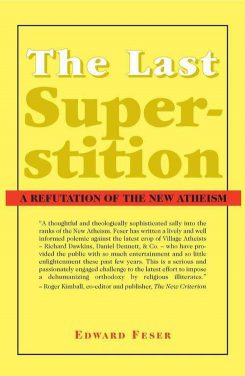The Last Superstition: Pie in the Sky When You Die
Chapter 4: Heaven and whatnot
Continuing his exploration of “natural law”, Feser “reminds” us that
First of all, since knowing God is our highest end, our moral duties include, first and foremost, religious duties: duties to pursue knowledge of God, to honor Him as our Creator and the giver of the moral law, to teach our children to do the same, and so forth.
This is another of Feser’s non sequiturs: even if we accept that humans are supposed to know God, how does it follow that we’re supposed to worship it? The goal of nuclear physics is to thoroughly know the atom. Does that mean that physicists shoud worship it? Do literary scholars worship Shakespeare and Cervantes, and teach their children to do likewise? Feser hasn’t even demonstrated that God is intelligent, let alone that it wants or deserves honor or worship.
He then tells us that if you don’t think there’s an afterlife,
This life, in both its good and bad aspects, takes on an exaggerated importance. Worldly pleasures and projects become overvalued. Difficult moral obligations, which seem bearable in light of the prospect of an eternal reward, come to seem impossible to live up to when our horizons are this-worldly. Harms and injustices suffered in this life, patiently endured when one sees beyond it to the next life, suddenly become unendurable. This is one reason secularists are often totally obsessed with politics and prone to utopian fantasies. They do not see any hope for a world beyond this one
This fits well, I believe, with one of Karl Marx’s more famous quotations:
Religious suffering is, at one and the same time, the expression of real suffering and a protest against real suffering. Religion is the sigh of the oppressed creature, the heart of a heartless world, and the soul of soulless conditions. It is the opium of the people.
But I think Greta Christina put it better than I could in “Why Are You Atheists So Angry?”:
If people believe they’ll be rewarded with infinite bliss in the afterlife — and there’s no way to prove whether or not that’s true — people will let themselves be martyrs to their faith, to an appalling degree. More commonly, if people believe in infinite bliss in the afterlife, they’ll be more willing to accept an appalling degree of oppression and injustice in this life. From anybody.
Oddly, this is often framed as a plus. “Religion gives people hope in hardship.” It gets presented as a feature, not a bug. But I fail to see how encouraging oppressed people to suck it up until they get pie in the sky is a good thing. (For the oppressed, anyway. Why it’s good for the oppressors is crystal clear.)
[Chapter 3, “Succumbing to political oppression”]
It’s also worth noting that Feser mentions “an eternal reward”, but nowhere has he attempted to justify this. He has argued that some ill-defined thing he calls a “soul” survives people’s death (perhaps in the same way that “triangularity” persists after you’ve erased an individual triangle), but nowhere does he argue that souls are conscious, or that the afterlife can be pleasant or unpleasant, or that this is in any way connected to a person’s actions in life. In other words, the word “reward” here slips in an awful lot of presuppositions through the back door, with no justification. This seems to be part of Feser’s modus operandi: start by making and defending a weak claim (e.g., there is something worth calling “soul” that persists after a person dies), digress for a few pages or chapters, then claim that he has successfully demonstrated a much stronger claim (souls are conscious and enjoy eternal bliss or suffering).
